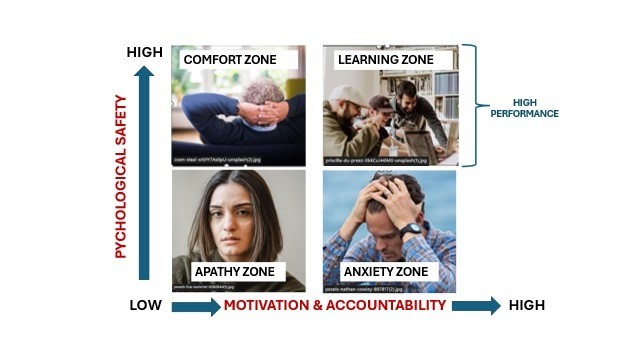Psychological Safety is often referenced by various sources as being essential for creating an innovative, collaborative, and engaged workforce, making it a key driver of organizational success.
However, while moderate levels of psychological safety enhance performance, excessively high levels may negatively impact routine task performance. After all, not all tasks require novelty, learning, and exploration, which are the focal objectives of cultivating a psychologically safe climate. Many jobs after all, are highly standardized and allow employees little autonomy over how they are performed.
Production and retail jobs, for example, are often based on repetitive and explicit tasks. Even the most complex jobs in professional areas, like health care and education, require many repetitive and standardized tasks. Routine tasks are more common than those requiring challenging the status quo and creativity, meaning that high levels of psychological safety can become counterproductive, potentially becoming a risk to performance.
Although psychological safety is essential to enabling employees to speak up, share innovative ideas, and provide critical feedback, if pushed too far where accountability and performance standards are neglected, it can lead to complacency. The key then is to create a psychologically safe environment where employees feel empowered to speak up but also motivated to meet high standards of performance, driving both innovation and efficiency.
As is often the case, two things can be true at the same time. The key here is to find a balance between having psychological safety, while at the same time not compromising motivation and accountability. The ability to be adaptable to the situation at hand is what counts.
Practicing emotional intelligence helps to maintain this balance where social responsibility for example needs to be balanced with reality testing. While psychological safety is essential for promoting innovative behaviors and collaboration, too much psychological safety can lead to complacency
Perhaps the key here is to recognize that although fostering psychological safety is vital, ensuring it doesn’t reach a level where performance standards drop, or routine tasks suffer is crucial for sustained organizational success.
Emotional intelligence (EI) plays a crucial role in navigating the balance between providing psychological safety and ensuring motivation and accountability. Emotionally intelligent leadership can navigate the balance between these two seeming dichotomies. This is where employees feel safe enough to speak up about mistakes or concerns without fear of judgment, while at the same time maintaining a clear focus on performance and standards by holding themselves and others accountable in a way that is constructive, and not punitive.
Emotionally intelligent leaders support constructive feedback by giving and receiving feedback in a way that promotes growth rather than fear or defensiveness. Emotionally intelligent leaders understand how to deliver feedback that is both candid and empathetic.
What are your thoughts on this? Do you agree that the amount of psychological safety is dependent upon the type of business, or do you think it is a necessary driver of organizational success regardless of the type of business? Is psychological safety and motivation and accountability a necessary pre-requisite for all high performing organizations, and if so to what degree?


